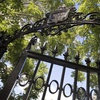{shortcode-72c1777b4c19ae8730ae056c30560fb87fce63e5}
{shortcode-94eb72a004011d7c49a15590d1d8fe33fbc5a9e2}onie K. Lesaux had been a professor at the Harvard Graduate School of Education for more than two decades — nearly her entire professional career — by the time she was named dean in March.
A scholar of early childhood education and literacy, Lesaux’s extensive scholarship and minimal political engagement has allowed the new dean and the education school to fly under the radar amid an escalating campaign by the Trump administration to defund Harvard and influence faculty speech.
But the school relies heavily on the federal funding now the subject of a legal battle between Harvard and the White House. 22 percent of HGSE’s operating budget is funded by government funding and private grants — trailing only Harvard’s medical, public health, and engineering schools in grant reliance.
Lesaux herself has received more than $6 million in federal research grants since she started at Harvard in 2003. The money funded studies on early childhood curriculum, literacy development, and reading comprehension among Spanish-speaking students.
As several other Harvard schools, including Harvard Divinity School and the School of Public Health have been singled out for funding threats from Washington, the education school has so far emerged unscathed. With nine months of interim training, Lesaux’s job will be to keep it that way.
David J. Francis, who worked with Lesaux early in her career on a federally funded study of how to teach reading to English language learners, said her narrow focus on data would serve Lesaux well as education policies take center stage in national politics.
“She is willing to follow the data wherever they might take her. She is an evangelist for children, not ideas, or products, and it’s frankly refreshing,” said Francis, now the director of the Texas Institute for Measurement, Evaluation, and Statistics.
“She is as thoughtful in her approach as anyone I have ever had the opportunity to meet or work with in education,” he said. “These are attributes that will serve her well in her role as Dean.”
A Data-Driven Approach to Education
Lesaux — a well known name in the field of early childhood education policy studies — stands to be a particularly effective messenger for the value of researchers’ work.
Becoming an endowed professor just four years after receiving her Ph.D., Lesaux has 65 papers and eight books to her name, with topics ranging from dyslexia in college students to the effects of Covid-19 on educators.
Michael J. Kieffer, Lesaux’s first graduate student and an associate professor at New York University, said she served as a mentor to him in the field of education.
“She’s really deeply dedicated to policy and practice in education, and how we can really improve learning opportunities,” Kieffer said, “She’s deeply committed to doing work that is getting it right in terms of the science, but is also having an impact on practice and policy.”
While teaching at Harvard, Lesaux also chaired the Massachusetts Board of Early Education and Care during the pandemic. She started her work with the committee in 2010 when she was commissioned to find alternative metrics to the Massachusetts Comprehensive Assessment System for determining elementary reading comprehension.
“Your leadership and insistence on equity has been critical to this field,” Amy O’Leary, executive director at Strategies for Children, said to Lesaux at her last board meeting in 2022.
Francis, who started working with Lesaux while she was completing her Ph.D. at the University of British Columbia, said she quickly lapped senior researchers, pouring over dissertations and reports about language instruction for English Learners.
“She did the heavy lifting of locating and reading through the vast literature on language of instruction,” David wrote. “Her ability to communicate complex information to multiple constituencies is truly remarkable.”
He added that his biggest concern about her appointment as dean is how it could affect her research career.
“I have mixed emotions about her becoming dean — not about her ability to lead the faculty and students or the College writ large,” Francis said. “My mixed emotions come from the limits that being Dean will place on Nonie’s time for directly engaging in research in education.”
‘We Want Some Stability’
In picking Lesaux, formerly the school’s academic dean, Garber followed an emerging trend in dean appointments to elevate candidates already serving on an interim basis.
For Lesaux, her interim appointment came at a particularly tense moment for the University. Garber had not been permanently appointed, donors were still revolting after former Harvard President Claudine Gay’s resignation, and pro-Palestine protesters were occupying Harvard Yard.
Like Garber, Lesaux had won over the faculty during the Covid-19 pandemic for her management skills, and gained the trust of the HGSE community by leading during unprecedented times.
Paul Reville, a HGSE professor who studies higher education administration, said that valuing familiarity in leadership was a logical choice for the moment.
“I think when we’re in turbulent times like this where the institution itself is facing existential threats, you’re not typically looking to go outside and bring somebody in to start anew,” he said.
As interim dean, Lesaux served during the 2024 election cycle, and continued to lead HGSE as the White House launched an investigation into antisemitism at Harvard. While she never publicly addressed the heightened scrutiny, she acknowledged the world of education had changed since 2003.
“I am stepping into this role — and together we are launching the School’s next chapter — at a time when the path ahead is complex but also presents so many opportunities,” Lesaux wrote in an email to school staff after her permanent appointment was announced.
“Looking back at HGSE’s history of rising to new challenges, I know we will create powerful new ways of serving our profession, of leading learning with populations around the world, and of amplifying our collective voice to serve society through education,” she added.
Martin West, Lesaux’s successor as HGSE academic dean, said Lesaux’s leadership during the pandemic was an unexpected proving ground for the new dean.
“Nonie served as the school’s academic dean at the outset of the pandemic, which presented not identical challenges to what were facing now but challenges similar in magnitude, and she played a key role in supporting our faculty in transitioning to online learning,” West said, “I think that experience and seeing her in action amid the pandemic gives me great confidence about her ability to lead in challenging times.”
“I think people were relieved to have a dean named from within our community, rather than from the outside,” West added.
Jacob Wolf, a HGSE Ph.D. student who took Lesaux’s class during his first year in the program, said she had a “thoughtful and supportive” teaching style that could translate well to an administrative post.
“Her long-term commitment to HGSE has certainly made this community stronger,” Wolf wrote.
During the dean search, Reville said the current political moment requires stabilizing leadership.
“Everybody’s anxious. We want some stability, we want some forward motion, we want communication skills,” Reville added, “Nonie is a very good strategic thinker.”
‘Not an Ideological Person’
As the Trump administration follows through on campaign threats to gut higher education and rework elementary education, the work of HGSE researchers — often prescriptive on education policy — is under a national microscope.
Republican policies on the state and federal level to restrict access to books, crack down on discussions of LGBTQ identity, and reduce student loan support for college students were already on the rise well before Harvard and other universities came under fire for protests on their campuses.
Without addressing republican politicians directly, Lesaux endorsed former U.S. President Joe Biden’s campaign promises on child care tax credits in 2021, calling it a “profound first step toward investing in children’s early experiences and education,” in a piece for The Hechinger Report.
But she has stuck closely to her area of expertise in political commentary, also arguing that there was not enough research on early education available to inform policymakers.
“She’s not an ideological person in my experience, but she’s a pragmatic person who holds to her principles,” Kieffer added.
Harvard’s newfound voice in the fight against Trump, however, could create a test from within her school for Lesaux’s commitment to objectivity.
Students at the school are facing new challenges finding jobs in humanitarian fields and public teaching careers as federal agencies lose funding and the government workforce is reduced.
Last week, more than 140 HGSE students and faculty signed a letter urging Harvard to resist the Trump administration’s demands and condemned his education policy, including an executive order to shutter the Department of Education.
And despite relative quiet from the HGSE dean’s office, the school was included with the Divinity School and School of Public Health on a list of schools the Trump administration said needed to be reformed for “egregious records antisemitism or other bias.”
These factors make Lesaux’s work as dean especially complex. But colleagues have confidence in her ability to take challenges as they come.
“She is taking on the role of Dean during a particularly challenging moment,” Wolf wrote. “Now more than ever, we need university leaders who will step up to defend students being targeted by the Trump administration.”
—Staff writer Mackenzie L. Boucher can be reached at mackenzie.boucher@thecrimson.com.












